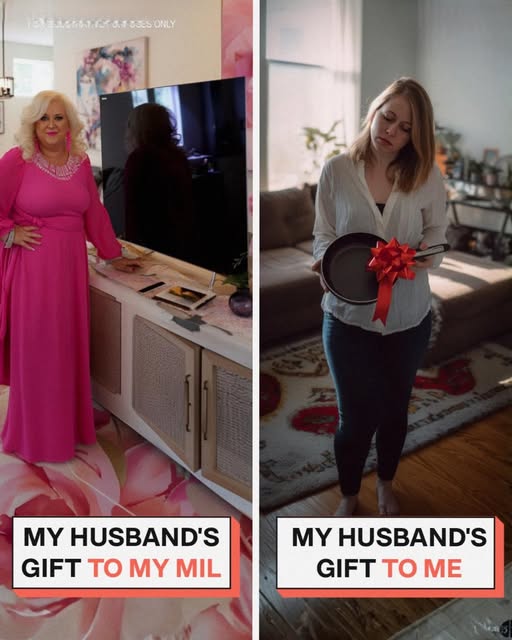Emily’s birthday had always been a quiet affair, a small candle on a humble cake, the kind of celebration that felt personal and warm. But over the years, it had become a subtle battlefield, an unspoken contest that her mother-in-law, Linda, seemed to win without effort. Jake, her husband, had a strange way of showing affection—or at least, that was what Emily called it—by showering Linda with gifts that left Emily feeling invisible, unappreciated, and oddly embarrassed in her own home.
That morning, Emily woke to the familiar sight of neatly wrapped boxes stacked on the living room table. Her heart fluttered with hope, a tiny hope that maybe, this year, she would be seen. The first gift she unwrapped was a mug. A plain ceramic mug with a cheerful quote, something she had seen in hundreds of stores. She forced a smile, while her mind quietly counted the zeroes on the price tag.
Then came the pizza—a little late, arriving after she had already eaten breakfast. Jake had meant well, she guessed, but the timing stung. Then came the robe. Not just any robe, a $19.99 bathrobe, thin, almost translucent in places. And finally, the “big” gift, a plain frying pan. Emily stared at it, incredulous, the edges of her lips curling into a grimace.
Across the room, Linda’s gifts glimmered under the morning light—a gold bracelet, delicate and sparkling, a weekend spa package for two, and a $2,000 television that gleamed like a shrine. The unfairness was palpable, practically humming in the air, and Emily’s cheeks burned—not with embarrassment, but with a slow, simmering anger.
She kept her composure, as she always did, but inside, a plan began to form. If this was how Jake valued people, then she would not quietly accept it. Within hours, she had sold the TV. Not with malice, but with quiet satisfaction, she pocketed $1,800 and booked herself a solo trip to Hawaii—a long-overdue escape from the suffocating hierarchy of gifts and favors.
But she didn’t leave without a statement. The following Sunday, Emily announced a “pancake breakfast” for the whole family. Everyone gathered, curiosity sparking in the air. Linda, smug as ever, smirked as Jake carried in the breakfast trays, expecting compliments and gratitude. Emily, calm and collected, began pouring syrup over the fluffy pancakes, eyes twinkling with mischief.
“Before we eat,” Emily began, voice light but firm, “I have a little confession. You may have noticed a pattern with gifts in this family.” She paused, letting the silence stretch, feeling the weight of every eye on her. “Jake’s favoritism has been… consistent.”
Gasps echoed around the room. Jake’s face flushed crimson, and Linda’s confident smile faltered, just slightly.
Emily continued, her tone cutting through the tension like a knife. She handed Jake the frying pan. “This belongs to you,” she said. “I didn’t ask for it, and it was never meant for me.” Then she revealed her plans for Hawaii, adding, “I’ll be back, refreshed and fully aware of my self-worth.”
The family murmured, half in shock, half in awe. Jake opened his mouth to protest, but Emily had already walked out, her head held high, leaving behind murmurs, gasps, and a breakfast that suddenly felt strangely awkward. That evening, she posted her story online—a mix of humor, empowerment, and justice—sharing every detail with friends who cheered her on with emojis, likes, and supportive comments.
Weeks later, she returned, renewed, confident, and radiant from her Hawaiian escape. But the house was empty. Jake had gone, predictably, to his mother’s, and Emily felt a quiet, unspoken victory. She gathered the cheap, uninspired gifts Jake had given her over the years—the mugs, bathrobes, tiny gadgets—and carefully boxed them. She drove to Linda’s house, leaving the packages on her porch with a note: “They never belonged to me.”
Finally free from the chains of expectation, favoritism, and petty family politics, Emily smiled. She opened her own kitchen, frying pan-free, and whispered to herself: “Non-stick, just like me.” It was a small, sweet victory, but a victory nonetheless—a declaration that she valued herself, her happiness, and her freedom above all else.
And in that quiet moment, Emily realized something profound: sometimes, the best gifts are the ones you give yourself, the ones that cost nothing but courage, and the ones that leave you unburdened, glowing, and unapologetically alive.
